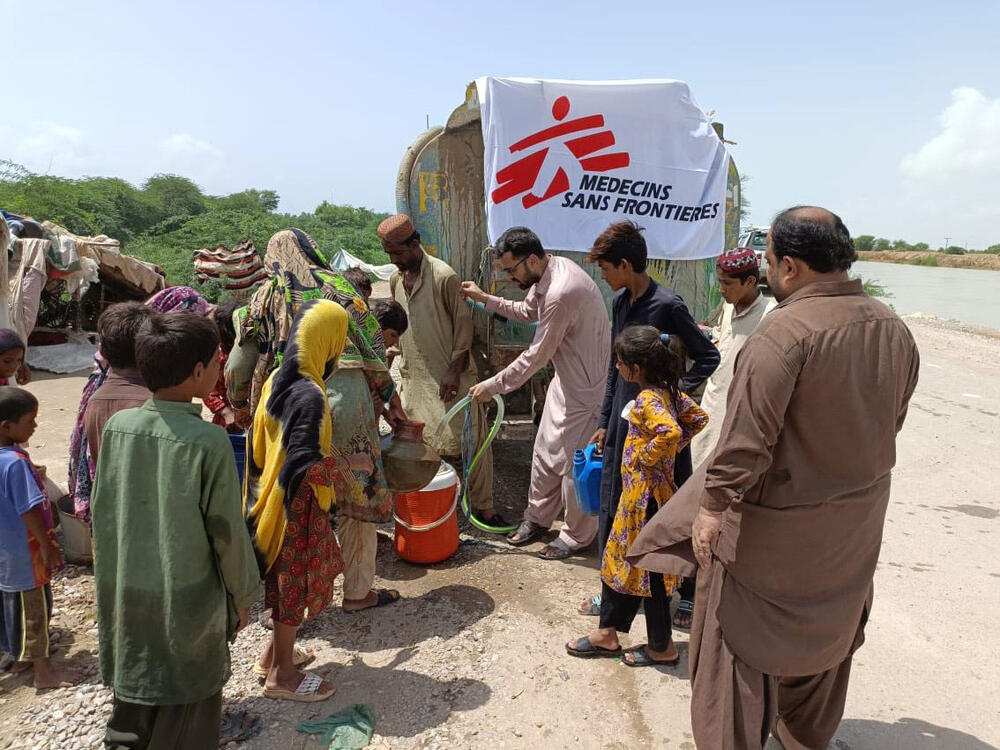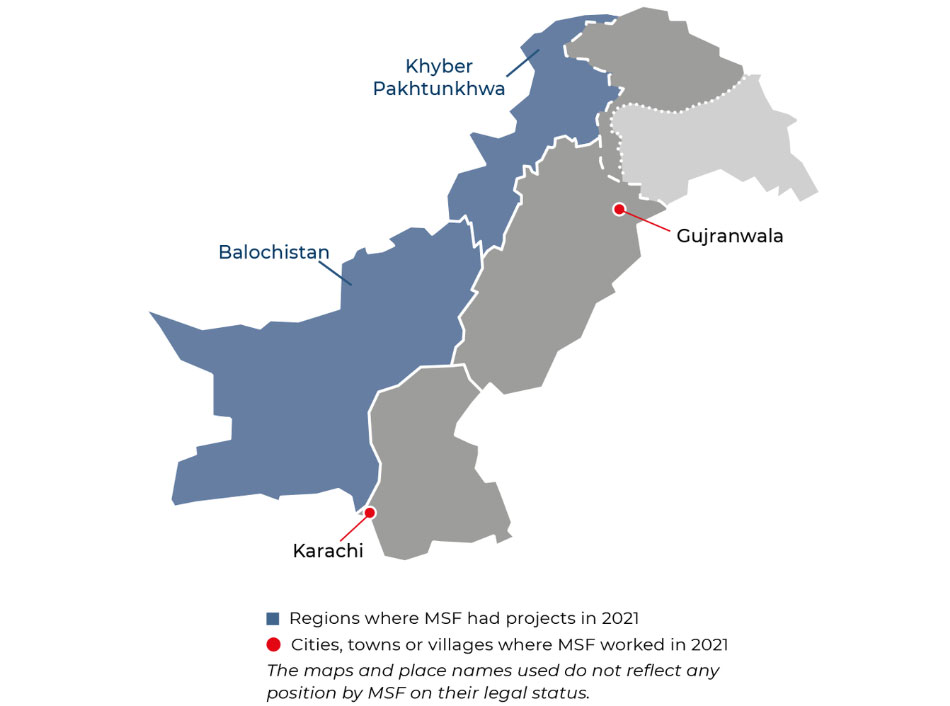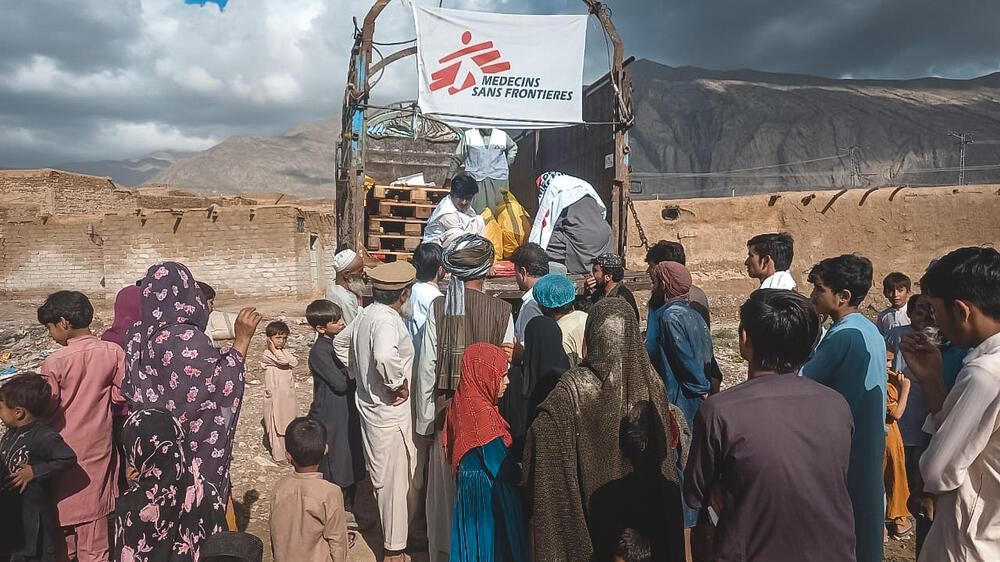Pakistan floods: What is MSF doing and how can I help?
Médecins Sans Frontières / Doctors Without Borders (MSF) teams are already in Pakistan, working to adapt our existing medical projects as the situation evolves.
Please read on if you are interested in supporting MSF’s life-saving work in Pakistan.
What is happening in Pakistan?
Pakistan has suffered widespread destruction caused by flooding from unprecedented monsoon rains. A third of the country is now under water, affecting at least 33 million people. Over 1,000 lives have been lost, with more than 1,500 injured.
According to Pakistan’s meteorological office, the country has received twice the usual monsoon rainfall, while the provinces of Balochistan and Sindh have seen more than four times the average over the last three decades.
An urgent and increased humanitarian response is needed, prioritising access to safe water and shelter.
What is MSF doing in Pakistan?
The situation in Pakistan is fast-moving and likely to change: the information below is correct as of 31 August 2022.
Balochistan
- In Balochistan province, 31 out of 33 districts have been severely affected by the flooding. Some areas around the city of Dera Murad Jamali (DMJ) have experienced significant flooding over the last two weeks.
- Our staff, many of whose own homes have been flooded, responded quickly to provide basic healthcare to people seeking shelter in schools and along roads.
- MSF has now started mobile clinics in DMJ, providing primary healthcare and healthcare promotion, as well as referrals to the MSF-supported district headquarters hospital in DMJ.
- Most of the patients we’ve treated have respiratory infections, fever, skin diseases and diarrhoea. Our teams are also screening children for malnutrition. So far, the volume of patients has not been huge, however, this is most likely due to access issues as many towns and villages remain cut off by the floodwater.
- Our teams are also providing safe drinking by setting up water points and distributing non-food items such as soap, cooking utensils and mosquito nets to displaced people.
- MSF also has projects in the cities of Quetta and Chaman, closer to the border with Afghanistan. Our teams here have set up emergency water distribution points, donated non-food item kits and started a further mobile clinic.
- Emergency assessments are also being carried out in Killa Abdullah district in northwest Balochistan.
Khyber Pakhtunkhwa, Punjab and Sindh
- MSF teams are now on the ground in the Dadu district of Sindh province, after facing difficulties reaching people sheltering in camps with so many roads having been swept away.
- We are currently assessing the needs and preparing to deliver emergency support. Indications are that up to 60 percent of houses made of mud have been destroyed.
- Now, our teams are preparing for possible outbreaks of water-borne diseases such as cholera and insect-spread diseases like malaria.
- There is an urgent need for clean drinking water, hygiene kits and medical care to avoid the further spread of skin infections and diarrhoea.
- We also have teams assessing humanitarian needs in the Dera Ghazi Khan and Rajanpur districts of Punjab province, as well as Charsadda and Nowshehra in Khyber Pakhtunkhwa province.
How can I help MSF in Pakistan?
Thanks to the generosity of people like you donating to our general funds, we haven't needed to launch an appeal for our work in Pakistan.
Please consider giving an unrestricted donation, which will give our medical teams across the world the valuable flexibility to respond as needs arise.
Click here to learn more about how we spend your money
MSF in Pakistan: Before the floods
MSF has been working in Pakistan since 1986, responding to natural disasters and insecurity and providing access to basic healthcare services.
Today, our medical projects are focused on improving care for pregnant women and children, as well as treating infectious diseases such as hepatitis C, and cutaneous leishmaniasis. We have also been supporting the country’s response to the COVID-19 pandemic and providing care for refugees from neighbouring Afghanistan.
In 2021, our teams assisted over 19,000 births and admitted more than 10,000 malnourished children into therapeutic feeding programmes.
MSF and the climate emergency
The climate emergency is also a healthcare emergency. When extreme weather events occur, it is the most vulnerable people who suffer the most.
This crisis isn’t only about the catastrophic cyclones and typhoons that hit the headlines. This is about the spread of deadly diseases that can follow. The increasing risk of drought and famine. Of rising water levels. Desertification. The mass displacement of people from their homes…
In every way, climate change is a major humanitarian emergency.


